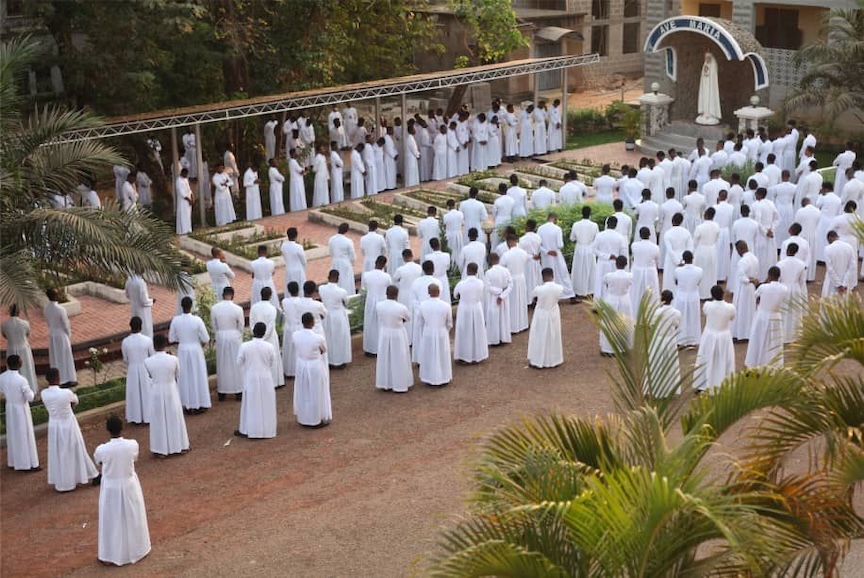Some people in our Church seem to be embarrassed by their fellow Catholics in Africa. The white man’s burden, it seems, is not yet to be laid down. In Kipling’s time, it meant bringing the faith to people who had never heard of Christ, along with the telephone and telegraph, the locomotive, engines for carving great holes in the ground in search of gems and precious metals, harvesters and threshers and reapers, the order and beauty of settled law, several millennia of human learning, and all the wonders of city life. In short, Christianity and western civilization.
In our time, he has another sort of burden on his back. It is not to teach black men how to dam up streams for irrigating an arid land. It is to teach them how to use little plastic devices so that they can practice septic paraphilias without getting hepatitis or the clap. It is not to teach them how to apply antiseptics and how to prescribe antibiotics so that women in childbirth or their children do not die. It is to teach them how to introduce carcinogenic chemicals – synthetic growth hormones, for example – into their systems so that they can enjoy freedom from children, those messy and annoying things.
It is not to bring to a civilization aborning the glories of the West. It is to bring to a civilization in its youth the exhaustion and the shame of the West. Joseph Conrad wrote his terrible fable Heart of Darkness about how Africa’s darkness overwhelmed, in the erstwhile missionary Mr. Kurtz, the all too frail Christian faith of the Western man.
But now, if you want darkness, grim silence, suspicion, dispiritedness, go to New York, not Nairobi; go to London, not Lagos. The roles are reversed. Nigeria sends her missionaries to England and the United States, and these brave pioneers of Christ must call upon His might and His protection, lest they be drawn in to the morbid and the moribund, and fall down before hideous idols, and become like the witless beasts.
Those Africans, we are told, have not yet progressed as far as we in the West have. If their patronizing critics mean in disease, then I agree, they have not progressed so far.
They have prejudices, we are told by high Church figures – cultural prejudices. Thank God for cultural prejudices, if that is what they are; a cultural prejudice implies that you do have a culture, while that most human and social of things is fading from the West; what the West now brings is a solvent for culture, an ideal of monochrome globalism, managed by the most ill-read, ill-bred, dim-sighted, and irreligious elites the world has ever produced.
And as for prejudice, we cannot get through a day without it. We must act, prompted by feelings, and the main thing is to get those feelings in right order. If you tell a healthy boy exactly what it is that sodomites do, sowing the seed of life in a pit of filth, disease, and decay, he should by rights feel disgust – his imagination should never have been able to conceive of such a perversion of sex and manhood and their meaning.

That is the heroine’s reaction in Kristin Lavransdatter, when her husband Erlund, who has seen more of the world than she has, tells her why the rich nobleman from Denmark wants their teenage son to be his page. She had not thought there was such wickedness in the world.
When I was a boy, and that miraculous change from childhood to adolescence came upon me, I did not say to myself that now I could have more pleasure than ever before. That did not occur to me. I said, with wonder, “I can be a father.” That was the right feeling to have. Of course, I had not thought things through. I was only thirteen years old. You may call this attitude a prejudice. It was the right prejudice.
Just so, a boy ought to feel indignation against other boys when they gang up on the slightly-built or the pudgy or unathletic fellow, indignation which hardly rises to words, except to note that such a thing is base and mean and contemptible.
He ought to feel a certain respect for the old man not in his right mind as he mutters his way down the street; he ought to be moved by the grace and beauty he finds in the girl next door.
How many are the prejudices which health of body, mind, and soul confers upon us! Reverence for animals, even when we use them as our servants; patience with the very young; inclination toward noble aims; yearning for God.
All that said, surely the African dioceses are not in the grip of prejudice. We in the West have overthrown almost all sexual norms, and we now have sixty to seventy years of evidence as to what happens then. Who in his right mind would want what we are peddling?
If it brought us even a false joy, we might get some takers. But what is an African to see that should attract him? Deserts of loneliness; couples childless by choice; men and women by the hundreds doing in public parades in the sight of children what would get them arrested if they did it by ones and twos in their front yards; a public square notable for crudity and far worse; populations collapsing; men and women mutually suspicious and nearly incapable of appreciating the wonder of the other sex; confusion and acrimony, with children paying the price for the licentiousness of adults, which is exactly the moral structure of pedophilia, as I have often noted.
To say, after all of this, that you will not go down to Sodom by the boatloads, that you want to keep as far away from it as you can, is not prejudice. It is the only rational conclusion to be drawn.















